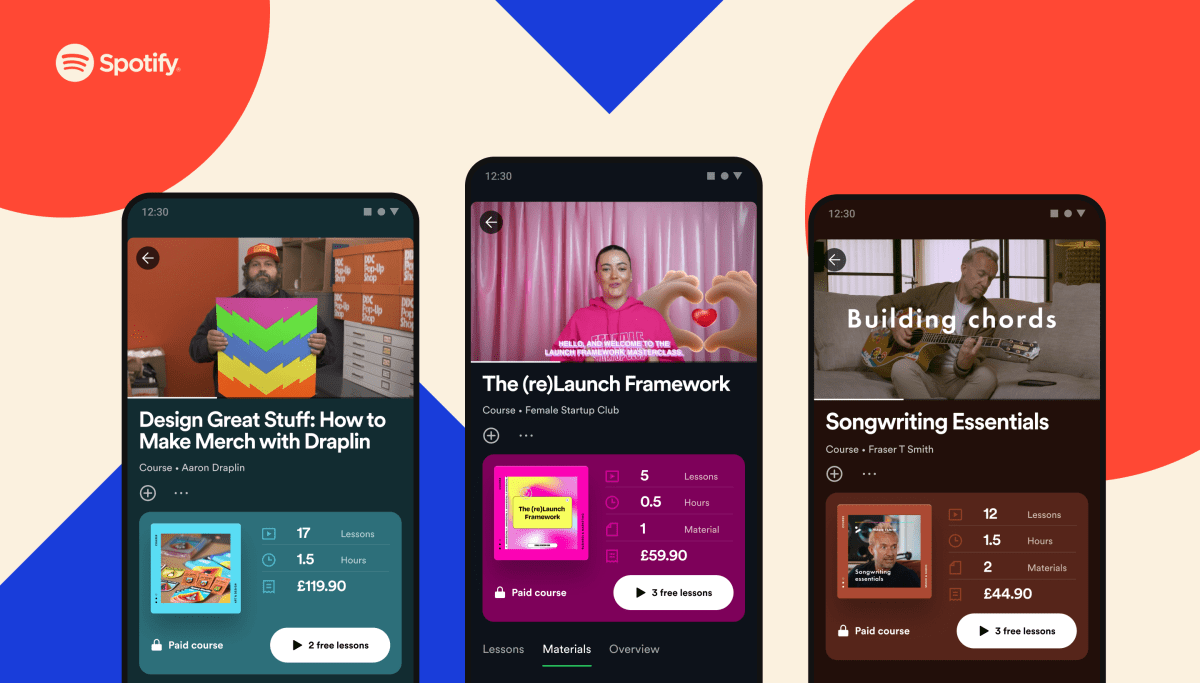Spotify has proven to be a formidable player in the music industry, leading the way with its music streaming platform and branching out into the worlds of podcasting and audiobooks. But now, the company is taking a bold step into a new realm: e-learning.
With over 600 million users, Spotify is constantly looking for ways to engage its audience and increase their time and money spent on the platform. In a move to actively achieve this, the company is exploring the potential of online education with its latest venture.
Available first in the U.K., Spotify is testing the waters with a freemium video course offering in partnership with third-party providers such as BBC and Skillshare. Users will have access to at least two free lessons with the option to purchase full courses ranging from £20 to £80 on average. Interestingly, the prices will remain the same for both basic and premium users, at least for now.
In an interview, Mohit Jitani, the London-based product director for Spotify’s education business, stated that pricing choices are just one aspect that the company is currently testing. “With this launch, we’re trying to gauge the demand first,” he said. “Then we’ll work towards making it more compelling and exciting.”
The e-learning content will be easily accessible on both Spotify’s home and browse tabs (under “Courses”), and can be accessed through the web or the Spotify mobile app.
Described as a mix between YouTube, Master Class, and LinkedIn Learning, the current catalogue offers a wide range of topics from music production to learning Excel, with a special emphasis on creating online courses for musicians and other “education creators.”
While there are plenty of online learning sites on the web, with interactive content and various media formats, Spotify’s approach differs. Instead of offering a gamut of options, the company is focusing on one-directional, on-demand videos.
This decision may seem unusual, especially when considering the increasing trend of gamification in the education industry. However, Jitani revealed that some courses will include additional material, though mainly in the form of extra documents rather than interactive elements. He remained tight-lipped about the possibility of future gamification or whether games will be included in Spotify’s roadmap.
“We’ll learn a lot about what people are actually interested in, and we will start getting a lot of segments around that. Then we’ll go and find… the best content.”
Collaborating with third-party publishers, Spotify hosts and sells the videos on its platform. Each party involved receives a share of the revenue, with content partners handling payments to creators. However, specifics such as the percentage split or potential discounts for premium subscribers have not been disclosed.
Why did Spotify venture into the education industry, and why did it choose the U.K. as its testing ground?
Jitani explained that this move aligns with the company’s strategy to diversify its business while seeking more consistent profitability and stronger margins. Choosing the U.K. for the launch was a no-brainer as it is one of Spotify’s largest and most engaged markets in the world.
Financially, Spotify has had its share of ups and downs in the current market. Last year, the company underwent three rounds of layoffs and has yet to break even in terms of profit, reporting a net loss of $81 million in February.
Although online learning and professional development may seem like a stretch for a company recognized for its music streaming, there are three areas where it makes sense for Spotify.
Firstly, with the growing popularity of its podcasting business, Spotify has gained valuable data on user behavior. This data has revealed a strong connection between the most listened to podcasts on the platform and education content. Around half of Spotify premium subscribers have shown interest in education and self-help themed podcasts. Capitalizing on this, Spotify plans to use its powerful recommendation algorithm to cross-promote its e-learning courses.
Secondly, Spotify has prioritized supporting creators and helping them grow their profits. The inclusion of educational content for running a business or improving music production fits perfectly with this goal.
Lastly, the addition of video content has been on Spotify’s radar for quite some time. While it has yet to make significant strides in the video industry, the recent launch of music videos in select markets and its educational video efforts indicate the company’s determination to succeed in this area.
In the grand scheme of things, Spotify’s foray into e-learning may seem unusual. However, with its vast user base and robust recommendation algorithm, the company may have just found the perfect formula to make this seemingly unlikely venture a success.








